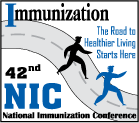
|
|
CDC NIP/NIC Home Page
|
Tuesday, March 18, 2008 - 4:05 PM
63
Adolescent vaccine knowledge and attitudes: Results from the 2007 HealthStyles and YouthStyles Surveys
Allison M. Kennedy and Deborah Gust. NCIRD/ISD/HSREB, CDC, 1600 Clifton Road, NE, MS E52, Atlanta, GA, USA
Learning Objectives for this Presentation:
By the end of this presentation, participants will be able to describe the vaccine knowledge and attitudes of 11-18 year olds and parents of 11-18 year olds in the United States.
Background:
In most states, newly-recommended adolescent vaccines are not mandatory for school entry; therefore parent and adolescent vaccine knowledge and attitudes are important factors in helping to understand voluntary uptake.
Objectives:
Our objective was to describe the vaccine knowledge and attitudes of 11-18 year olds and parents of 11-18 year olds in the United States.
Methods:
Vaccine-related questions were added to the July-August 2007 HealthStyles and YouthStyles Surveys; annual mail surveys conducted among a panel of U.S. adults and adolescents, respectively. We conducted a descriptive analysis of HealthStyles respondents with children aged 11-18 years (n=1,208) and YouthStyles respondents aged 11-18 years (n=1,087). Data were weighted to represent the general U.S. population.
Results:
The response rates for the surveys were 67% (4,398/6,600) for HealthStyles and 53% (1,357/2,566) for YouthStyles. Twenty percent of parents and 5% of adolescents were able to correctly name all three newly-recommended adolescent vaccines. The majority of both parents and adolescents disagreed with the statement that adolescents should be able to consent to vaccination without their parents' knowledge. Parent (87%) and healthcare provider (84%) recommendations were more important than peer behavior (17%) in motivating adolescents in their intention to be vaccinated. Few parents reported receiving information on newly-recommended adolescent vaccines from their child's healthcare provider in the last year (range: 18-23% depending on the vaccine).
Conclusions:
Knowledge of vaccine-preventable diseases and vaccine recommendations varied among parents and adolescents. Parental consent for vaccination was important to both parents and adolescents. Appropriate methods for better informing parents about adolescent vaccines, including improved communication from healthcare providers, should be explored.